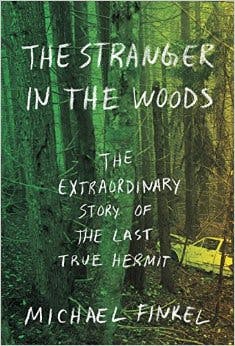For over two decades, residents near Maine’s North Pond, about 75 miles west of Bangor, were victims of one the strangest crime sprees in US history. Their homes were repeatedly burglarized, but valuables were never stolen. Instead, the thief took canned food, batteries, paperback novels, propane tanks, and dozens of other small, mostly inexpensive items. Residents resorted to security alarms, motion detectors, and reinforced locks. Nothing worked. They took to leaving out food on their doorsteps, hoping the intruder would take that instead of breaking in. This didn’t work either.

What they learned was that being a victim of such minor thefts can, in many ways, be just as bad, psychologically speaking, as more serious crimes. While the financial harm was often minimal, residents spoke of a sense of being violated. “I couldn’t leave my windows open,” one woman would later recall, “I couldn’t even go and sit by the beach without worrying. He stole every bit of my piece of heaven.” Beyond that, the unexplained nature of the crimes was itself unsettling: Why these things, and not others? Even a truly horrible crime can make sense, if there is a motive. These thefts were different. Not serious enough to be a major crime, but more than a harmless prank, these incidents rankled because they were inexplicable.
Then in 2013, using state-of-the-art Homeland Security sensors designed to patrol borders, a park ranger finally caught the thief: His name was Christopher Knight, and he’d lived entirely on his own in the woods for the previous twenty-seven years. He’d spoken to no one during that time, and made no contact with the outside world except for his nightly raids.
Journalist Michael Finkel learned of his story and began a correspondence with Knight while he was in prison awaiting trial for his hundreds of similar crimes; ultimately, Finkel flew out to Maine from his home in Montana to interview Knight and to tell his strange story. The Stranger in the Woods: The Extraordinary Story of the Last True Hermit is partly about what it means to be a hermit: Tactically, practically, psychologically. But Finkel’s book is also about what we want from hermits—why we’re endlessly fascinated by them, and why we’re just as often frustrated by them.
Knight’s story sounds like something straight out of Walden or the Life of Saint Anthony: A hermit abandoning the ways of civilization and humanity, turning his back on all comforts and community, a wilderness ascetic in search of solace and enlightenment in nature. He was only 20 years old when he decided, with little forethought or planning, to drive in the wilderness of Maine, north of where he’d grown up, further and further into the woods until his car ran out of gas. He left the keys on the dashboard and plunged into the wilds. Raised in a family of tinkerers and outdoorsmen, he was good at fixing things, knew how to work the land, and how to hunt and fish. But when he’d made his decision to disappear into the forests, he’d made no preparations, and had nothing on him with which to hunt, no fishing pole, almost no gear of any kind. All he knew was that he was never coming back to civilization.
Early cultures heavily emphasized the importance of communal bonding and obligation, urging the sacrifice of the self to the greater good. But while such bonding is necessary to keep civilizations alive, we’ve always prized those who rejected this: Outcasts like Socrates, Lao Tzu, and Jesus. And while the latter would become a fisher of men, his time alone in the desert would also in time inspire his followers: By the fifth century, the deserts of Syria were pockmarked with hermits, each looking for a little desolate wasteland of his (and occasionally her) own.
Hermits appeal to us because of the allure of simplicity. The hermit’s life is de-cluttered entirely from human connection or communion—living in a world without dentist appointments or small talk, distractions or annoyances. Living outside of our community, the hermit finds a necessary perspective: A God’s-eye view on the hustle and bustle of the world that consumes and distracts us. Hermitage has almost always been associated with religious or spiritual enlightenment—the purpose is never just to get away into nature but to learn from it. It’s a curiously goal-oriented project, even as its practitioners often reject such thinking.
Finkel frames his own interest in the subject in terms of domestic drudgery: “I first heard of Knight’s story,” he writes, “while scanning the news on my phone one morning, amid the din and spilled orange juice of my children…I thought about Knight as I vacuumed the breakfast crumbs, and I thought about him as I paid bills in my office.” To Finkel, and no doubt for many of his readers, Knight’s life represents a romantic escape—the kind of “fuck it all” gesture most of us dream of at least once in our lives. His act reveals the extent to which all of these supposedly important things in our lives can, in fact, be shed. It’s not always easy (Knight himself nearly died multiple times during Maine’s unrelenting winters), but it can be done.
Knight built himself a hidden encampment just out of sight near North Pond, and though he’d been raised never to break the law, he gradually understood that in order to survive, he’d have to steal. He avoided year-round residences, choosing to steal only from summer cabins, and planned his raids meticulously. Never entering a home while it was occupied, he’d sometimes wait hours outside to ensure it was empty. Before leaving civilization, he had worked briefly for a home security company, and with these skills he became a master thief, albeit one who rarely stole more than a few dollars’ worth of goods.
Without the means to live off the land, Knight developed a strange, parasitic relationship to the civilized world he’d abandoned. Utterly cut off from the world of humanity, he was nonetheless dependent on it. “Knight,” Finkel notes, “had fled the modern world only to live off of the fat of it.”
Among the more fascinating aspects of his story is just how close he was able to live near civilization, without ever being seen. His encampment was not plunged into the wilds of Alaska or Montana, miles from other humans. There were roads nearby, and he was a three-minute walk from the nearest cabin. He had good radio reception, and, as Finkel discovered when he visited the site, there was cellphone reception, too. As Finkel writes, Knight “wasn’t so much removed from humanity as sitting on the sidelines.”
The Stranger in the Woods shows that the line between civilization and wilderness is artificial and ultimately not very firm. For early colonialists and Puritans, “civilization” was the part of America they had colonized, pockets they had cultivated and were ready to defend. Everything beyond the edge of town—home to Indians, witches, and devils—was wilderness. Knight’s story suggests this topography is misleading. Removed from the world, he was completely dependent on it, and he required the technologies of the modern world to sustain his isolation. The places he stole from, meanwhile, were themselves deliberately perched in the wilderness: Summer homes and forest getaways, owned by city dwellers who wanted to be in nature without succumbing to it. Culture and wildness are not on opposite sides of some mythical border; they are interlaced and interconnected.
Reading The Stranger in the Woods, one is reminded of China Miéville’s sci-fi police procedural, The City and the City, in which two neighboring cities, Besźel and Ul Qoma, overlap one on top of the other, even though they remain completely separate entities. This separation is maintained via conscious acts of will by the cities’ citizens, who “unsee” anything that happens in the other city. It is a similar act of will that each of us employs to unsee the world that Knight discovered, even though it’s only a few feet in front of our faces.
There was nothing, according to Knight, that drove him into the wilderness. His family life was stable, and while he was a loner growing up, there was no trauma he was trying to escape, nor was there any debt he was trying to outrun. While at some points he seems to exhibit symptoms of Asperger’s Syndrome, he never appears to be suffering from any serious mental illness or antisocial attitudes. He seems simply to have wanted to be alone, and to have little interest in what the modern world was offering him. All he offers Finkel, when pressed, is simply, “It’s a mystery.”
The question driving Finkel’s enquiry is: What did Knight learn from his time alone in the wilds? After all, we’re drawn to hermits not just because of their freedom from all that binds us—mortgage payments, grocery shopping, PTA meetings—but also for their secret wisdom. The hermit, be it Saint Anthony in his Egyptian cave or Thoreau in his Concord pond, is there to dispense sage knowledge, and provide a perspective that the rest of us lack. Even if we can’t ditch the job, spouse and kids, we can glean a little bit from these lonely voices and their unique viewpoint. Maybe, we hope, the hermit can offer us something that we can keep with us even as we move through the modern world, and that will keep us sane as we drudge through our quotidian days.
Knight, however, does not offer this. “Some people want me to be this warm and fuzzy person,” he tells Finkel. “All filled with friendly hermit wisdom. Just spouting off fortune-cookie lines from my hermit home.” When Knight talks about his experience, he focuses on mechanics: How and when to steal, how to survive the Maine winter. Knight read a lot during his isolation, everything from Nietzsche and Shakespeare to Stephen King and random issues of Playboy, but he repeatedly refuses any of Finkel’s openings to dispense whatever wisdom or self-knowledge he’s gained. Finkel can only rattle off details of what Knight ate (macaroni and cheese, mostly), what he watched (Ken Burns’s The Civil War, Seinfeld), and the layout of his camp. None of it brings us any closer to Knight himself. By the end of the book, he’s still a cipher.
Christopher Knight is an anti-Thoreau, and Finkel’s book, an anti-Walden. This is unsurprising: The Maine hermit makes no secret of his disdain for Concord’s hero. “He had no deep insight into nature,” Knight tells Finkel, who elaborates: “Thoreau’s biggest sin may have been publishing Walden. Knight said that writing a book, packaging one’s thoughts into a commodity, is not something a true hermit would do. Nor is hosting a party or hobnobbing in town.” Thoreau did both. “These actions are directed outward, toward society.”
It’s definitely true that Thoreau was not the solitary hermit he depicted himself as in Walden; he lived much closer to town than he lets on, regularly saw friends, and had his sister do his laundry, but Walden nonetheless captures America’s complicated relationship to the wilderness and solitude, and is as relevant now as ever. “We must learn to reawaken and keep ourselves awake,” he writes, “not by mechanical aids, but by an infinite expectation of the dawn, which does not forsake us in our soundest sleep.” Whatever the inauthenticity of Thoreau’s circumstances, his book remains an authentic document.
Knight, by contrast, was completely authentic in his solitude, and yet his experience tells us nothing about anyone except Knight himself. The only way to learn what Knight learned, one realizes by the end of The Stranger in the Woods, is to ditch your car in the woods, and spend the next 26 years living it for yourself.
